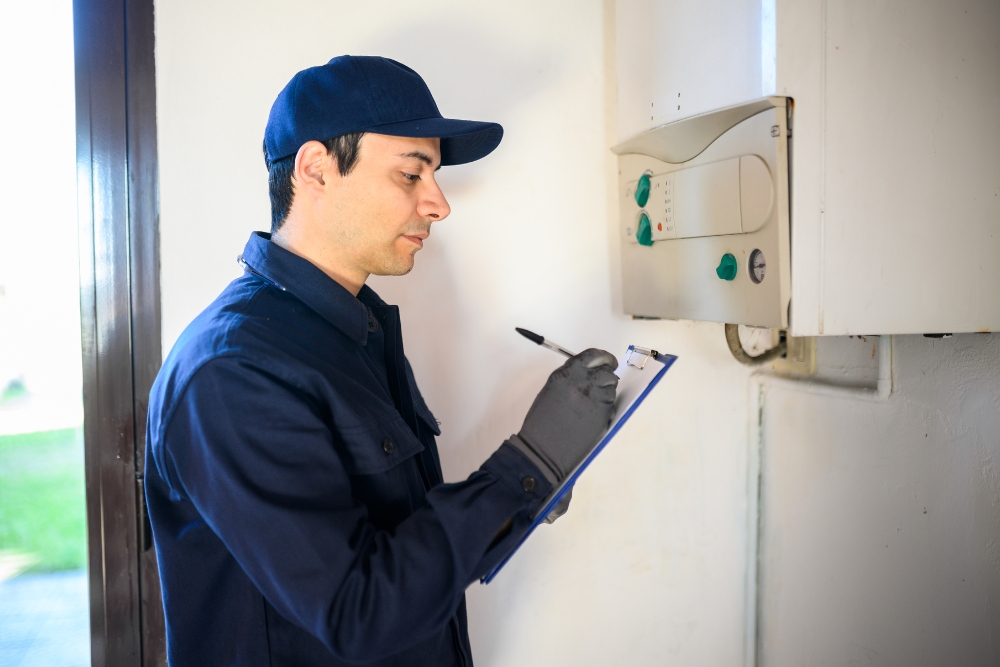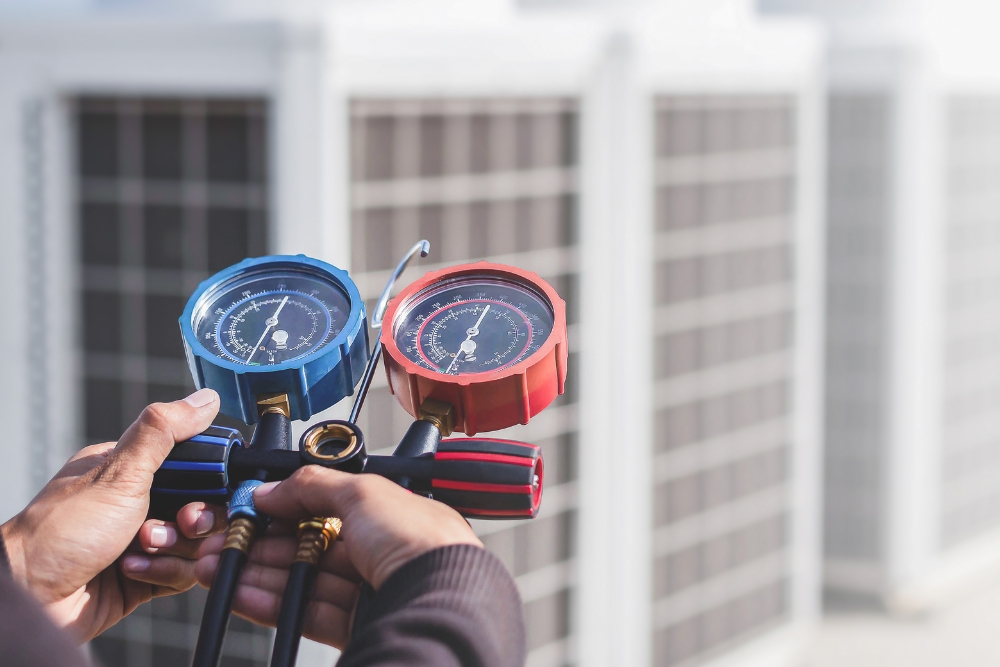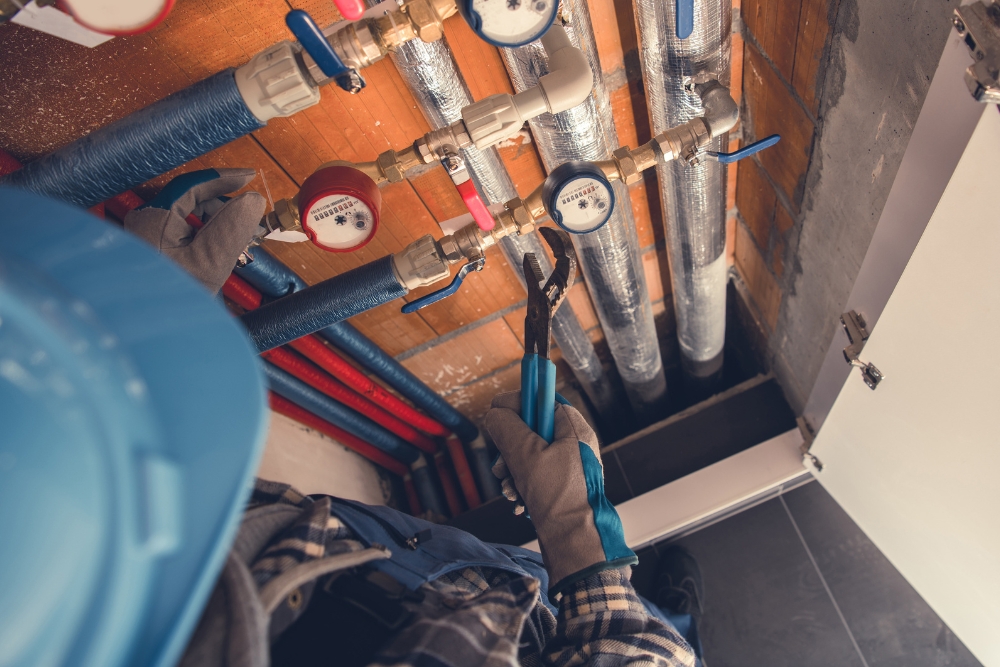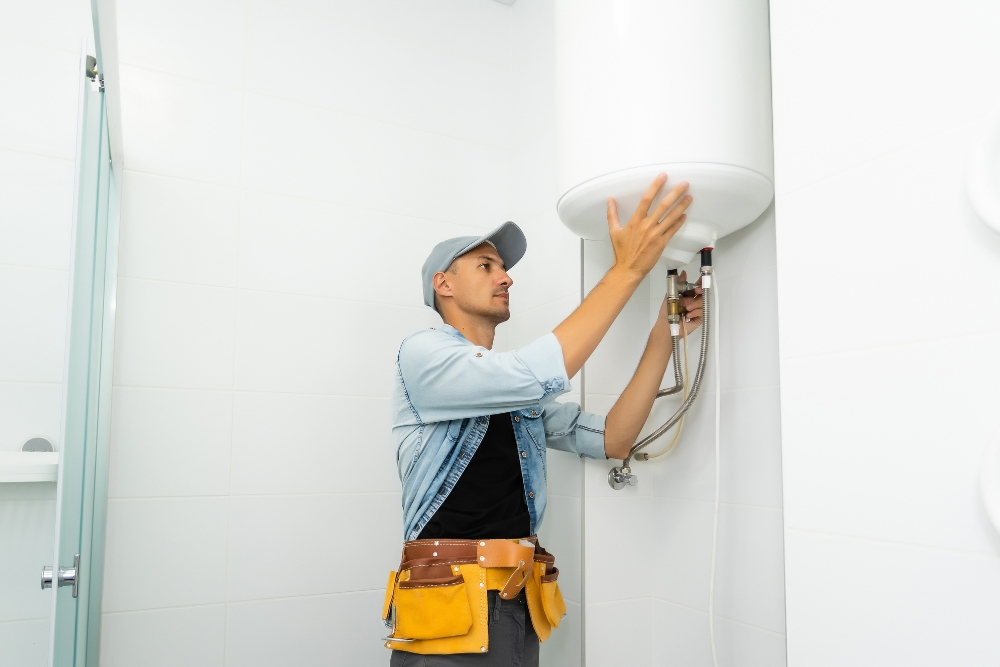Dealing with dodgy hot water pressure can be a proper nuisance for heaps of homeowners across the country. Trust us, we know the drill and have gone through the wringer trying to figure it all out.
Turns out, a big part of the problem often boils down to pesky sediment building up over time. In this blog, we’re keen to take you through spotting the usual suspects and sorting your hot water hiccups once and for all.
Stick around as we dive into how you can ramp up your hot water service!
Key Takeaways
- Checking for water leaks in pipes can save you from further issues with hot water pressure. Fix any found leaks quickly to keep things running right.
- The buildup of gunk and bits in your hot water system might be choking up the flow, so give it a good clean out regularly to avoid blockages.
- If your taps or showerheads aren’t doing their job properly because they’re clogged or broken, swapping them out could get your hot water pressure back on track.
- Your hot water system’s nuts and bolts like the pressure regulator valve and anodes need a look – too. Keeping these parts in check ensures everything flows smoothly.
- Sometimes DIY fixes don’t cut it, especially if the problems are puzzling. Calling in professional plumbers can sort serious snags and keep your system efficient.

Causes of Low Hot Water Pressure
Low hot water pressure can be caused by water leaks, sediment and debris buildup, and faulty showerheads and taps. Identifying these factors is crucial in addressing the issue effectively.
Fixing water leaks, clearing sediment and debris, and replacing faulty showerheads and taps are essential steps to restore normal hot water pressure.
Water leaks
We often overlook water leaks as a potential cause of low hot water pressure, but they play a significant role. If pipes in our hot water system have even small leaks, they can lead to decreased pressure.
This means less hot water reaches our taps and showerheads, making showers less satisfying and efficient.
Detecting these leaks early saves us from bigger headaches down the line. Look out for damp spots on walls or floors, an unexplained increase in water bills, or hearing running water when all taps are off.
Fixing any leaks quickly ensures our hot water system runs smoothly and maintains consistent pressure throughout the house.
Sediment and debris buildup
If you notice low hot water pressure, sediment and debris buildup in the hot water system may be to blame. Over time, minerals and dirt can accumulate in the pipes and tank, restricting the flow of water.
These deposits can lead to reduced efficiency of the heater by insulating heat from the burner or heating element, resulting in increased energy consumption. Moreover, sediment buildup often leads to an increased risk of damage to appliances due to overheating and corrosion, making it crucial to address this issue promptly.
Regular maintenance is essential as it helps prevent sediment accumulation which can eventually cause a blockage leading to more severe issues if not addressed early on. This will also ensure continued efficient operation and prolong the life of your hot water system.
Faulty showerhead and taps
Faulty showerheads and taps can lead to low hot water pressure. Sediment and debris buildup inside the showerhead or tap can restrict the flow of hot water, causing a decrease in pressure.
Additionally, leaks or clogs within these fixtures can contribute to the problem, affecting the overall water pressure throughout your home.
Replacing faulty showerheads and taps is crucial in addressing low hot water pressure issues. By ensuring that these components are functioning properly and free from blockages, you can maintain consistent water pressure for your daily needs.
The Impact of Low Hot Water Pressure
Low hot water pressure causes inconvenience in daily tasks. It also leads to increased energy consumption.
Inconvenience in daily tasks
Low hot water pressure can cause inconvenience in daily tasks such as showering, washing dishes, and doing laundry. It may result in longer wait times for the water to heat up or may even lead to an inadequate hot water supply, making these routine chores more time-consuming and frustrating.
Inconsistent hot water temperature due to low pressure can also affect daily activities by making it challenging to use hot water for cooking and cleaning tasks. This inconsistency often requires adjusting taps multiple times while performing these activities, adding unnecessary complexity and inefficiency to daily routines.
Increased energy consumption
Addressing low hot water pressure issues is crucial for homeowners as it can lead to increased energy consumption. When the hot water system is not functioning optimally, it requires more energy to heat the water to reach the desired temperature.
This results in higher utility bills and unnecessary wastage of resources. By promptly resolving low hot water pressure problems and ensuring an efficient hot water system, homeowners can effectively reduce their energy consumption and contribute to a more sustainable living environment.
Regularly checking and maintaining the hot water system helps prevent increased energy consumption due to low hot water pressure. Effective troubleshooting of low-pressure issues ensures that the heating elements do not have to work harder than necessary, leading to better efficiency and reduced electricity or gas usage.
Potential damage to appliances
Low hot water pressure can lead to potential damage to appliances such as dishwashers and washing machines. When these appliances don’t receive an adequate supply of hot water, they may not function efficiently, leading to longer wash cycles and increased wear and tear.
This inefficiency could result in higher energy consumption and utility bills.
In addition, low hot water pressure can also put a strain on the heating element within the appliance, potentially shortening its lifespan. It’s important for homeowners to address low hot water pressure issues promptly to prevent any unnecessary strain on their household appliances.
Solutions for Low Hot Water Pressure
To resolve low hot water pressure, fixing water leaks, clearing sediment and debris, and replacing faulty showerheads and taps are effective solutions. If you want to learn more ways to fix your hot water service pressure issues, continue reading the full article.
Fixing water leaks
To resolve water leaks, we must first inspect the hot water system for any visible signs of leakage. Oftentimes, leaks can be found around pipe joints and connections. Once located, these leaks should be promptly repaired to prevent further loss of pressure and potential damage to the system.

Regularly checking for and fixing water leaks is crucial in maintaining optimal hot water pressure. This proactive approach helps to ensure a consistent supply of hot water throughout the home while also preventing unnecessary wastage of water.
Additionally, addressing leaks promptly can contribute to prolonging the lifespan of the hot water system.
Clearing sediment and debris
To resolve low hot water pressure, we recommend clearing sediment and debris from your hot water system. Sediment and debris can accumulate in the tank over time, causing blockages that restrict the flow of hot water.
By flushing out the sediment and removing any debris, you can restore proper water flow and improve your hot water pressure. Regular maintenance is crucial to prevent build-up, ensuring a consistent supply of hot water throughout your home.
Regularly checking for sediment and debris build-up in your hot water system is essential to avoid potential issues with low pressure or inconsistent heating performance. Flushing out the tank will help maintain an efficient and reliable supply of hot water for all your household needs.
Replacing faulty showerheads and taps
To address low hot water pressure, we can replace faulty showerheads and taps. Sediment buildup in the showerhead or a faulty tap can restrict water flow and reduce the overall pressure of your hot water system.
By installing new, efficient showerheads and taps, you can improve the flow of hot water throughout your home. This simple solution can significantly enhance your experience with consistent and strong hot water pressure.
Moving forward to “Addressing Water Heater Problems,” let’s explore potential issues that may be affecting your hot water service pressure.
Addressing Water Heater Problems
Checking and replacing the pressure regulator valve can help improve hot water pressure. Inspecting and replacing anodes is also crucial in maintaining an efficient water heater system.
Checking and replacing the pressure regulator valve
To ensure optimal hot water pressure, it is crucial to regularly inspect and replace the pressure regulator valve. The pressure regulator valve controls the flow of water into the hot water system, regulating the pressure for a consistent supply throughout your home.
When this component malfunctions, it can result in decreased or inconsistent hot water pressure, impacting daily tasks and increasing energy consumption. By checking and replacing the pressure regulator valve as part of routine maintenance, you can effectively address low hot water pressure issues and maintain a steady flow of hot water.
When addressing low hot water service pressures, homeowners should prioritise inspecting and replacing the pressure regulator valve as it plays a significant role in maintaining a consistent and reliable hot water supply.
Inspecting and replacing anodes
Inspecting and replacing anodes is crucial to maintaining your hot water system’s performance. Anodes are designed to protect the tank from rust by corroding instead of the tank itself.
Over time, anodes can become depleted or even completely consumed, rendering them ineffective. Inspecting the condition of the anode rod regularly and replacing it when necessary will ensure that your hot water system continues to function efficiently.
Replacing anodes involves draining the tank, removing the old rod, and installing a new one. It’s essential to follow manufacturer guidelines for this process and consider seeking professional assistance if you’re unsure about how to proceed.
By staying on top of anode maintenance, you can prolong the lifespan of your hot water system and avoid potential issues related to low pressure or inconsistent heating.
Troubleshooting for other issues
If you notice that your hot water system is still experiencing pressure problems after checking the causes mentioned earlier, it’s time to investigate other potential issues. One common issue could be a malfunctioning thermostat, which can lead to inconsistent water temperature and pressure.
Another issue to look out for is a tripped circuit breaker, which can disrupt the functioning of your water heater. If these basic checks don’t resolve the problem, it may be time to call in professional help.
Regular maintenance and inspections are crucial in preventing such issues from escalating.
In addition, pipe maintenance plays a vital role in ensuring optimal hot water pressure throughout your home. Over time, pipes can become corroded or develop leaks, contributing to low hot water pressure issues.

When to Call in the Experts
If you notice persistent low hot water pressure despite troubleshooting the common issues, it may be time to call in a professional plumber. Expert assistance is crucial for resolving complex hot water system pressure problems and ensuring long-term efficiency.
Signs that you need professional help
If you notice consistently low or fluctuating hot water pressure throughout your home, it may be a sign that you need professional help. Additionally, if you experience an inconsistent supply of hot water despite addressing common causes of low pressure, like fixing leaks and clearing debris, it is advisable to seek the expertise of a professional plumber who can diagnose and address the underlying issues with your hot water system.
Malfunctioning thermostats or tripped circuit breakers causing the hot water not to work could also indicate the need for professional assistance. Professional plumbers have the expertise to troubleshoot these issues effectively and ensure that your hot water system operates optimally.
Importance of routine plumbing services
Regular plumbing services are crucial in maintaining the optimal performance of your hot water system. By scheduling routine maintenance, you can ensure that potential issues with low hot water pressure are identified and addressed promptly.
Professional plumbers have the expertise to detect and rectify any underlying problems before they escalate, saving you time and money in the long run.
Furthermore, regular servicing helps extend the lifespan of your hot water system by preventing wear and tear. It also ensures that your system continues to operate efficiently, providing consistent water pressure throughout your home.
With routine plumbing services, you can have peace of mind knowing that your hot water service is in top condition and ready to meet your household’s needs.
Benefits of professional hot water system maintenance
Regular maintenance of your hot water system by a professional is crucial to ensure efficient operation and prevent potential issues. Professional maintenance can help in identifying and addressing small problems before they turn into major, costly repairs.
By having a qualified technician regularly inspect and service your hot water system, you can prolong its lifespan and maintain optimal performance, saving you money on energy bills while ensuring a consistent supply of hot water for your daily needs.
Professional hot water system maintenance also ensures that any underlying issues contributing to low pressure are promptly addressed, keeping your system running smoothly at all times.
Address Hot Water Service Pressure Issues
Solving hot water service pressure issues involves addressing underlying causes. Debris and sediment buildup can lead to low pressure, affecting daily tasks. Regular maintenance can prevent and fix such problems, ensuring a consistent supply of hot water.
It’s essential to understand the causes and take proactive measures for a hassle-free hot water system. Professional help may be necessary in complex situations, safeguarding your home’s comfort and convenience.






